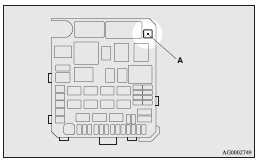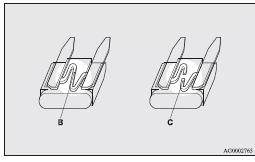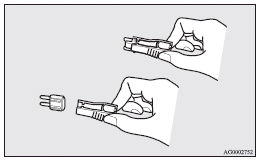Fuse replacement
1. Before replacing a fuse, always turn off the electrical circuit concerned
and place the ignition switch in the “LOCK” position.
2. Remove the fuse puller (A) from the inside of the fuse box in the engine compartment.

3. Referring to the fuse load capacity table, check the fuse pertaining to the problem.

B- Fuse is OK
C- Blown fuse
![]() Note
Note
► If any system does not function but the fuse corresponding to that system is normal, there may be a fault in the system elsewhere. We recommend you to have your vehicle checked.
4. Insert a new fuse of the same capacity by using the fuse puller and insert the fuse at the same place in the fuse block.

![]() Caution
Caution
► If the newly inserted fuse blows again after a short time, we recommend
you to have the electrical system checked to find the cause and rectify it.
► Never use a fuse with a capacity larger than that specified or any substitute,
such as wire, foil, etc.; doing so will cause the circuit wiring to heat up and
could cause a fire.
See also:
Upholstery
1. To maintain the value of your new vehicle, handle the upholstery carefully
and keep the interior clean. Use a vacuum cleaner and brush to clean the seats.
If stained, vinyl and synthetic leathe ...
Windscreen washer
The washer fluid will be sprayed onto the windscreen by pulling the lever towards
you. The wipers operate automatically several times while the washer fluid is being
sprayed.
CAUTION
If the wa ...
How the Supplemental Restraint System works
The SRS includes the following components:
1- Airbag module (Driver)
2- Front passenger’s airbag OFF indication lamp
3- Airbag module (Passenger)
4- Driver’s knee airbag module*
5- Front pa ...
